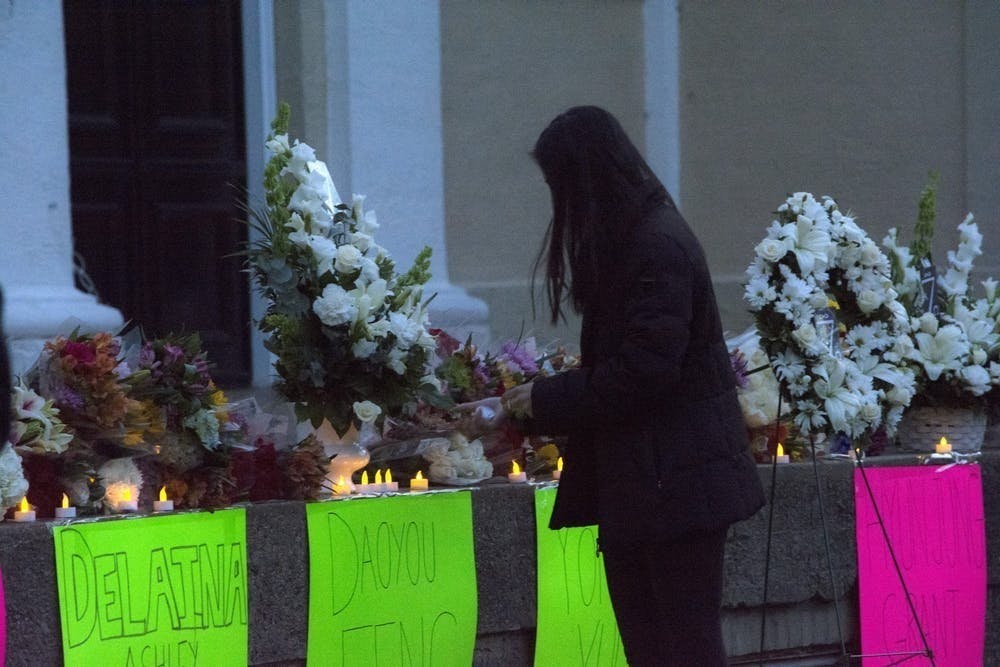On July 14, 2020, an unnamed 89-year-old Chinese woman was approached by two men who slapped her and set her on fire. On Feb. 3, 2021, Noel Quintana, a 61-year-old Filipino man was on his way to work when he was slashed across the face from ear-to-ear. On March 16, 2021, eight people — six of whom were Asian women — named Xiaojie Tan, Daoyou Feng, Soon Chung Park, Hyun Jung Grant, Suncha Kim, Yong Ae Yue, Delaina Ashley Yaun Gonzalex and Paul Andre Michels were murdered at their workplaces in Atlanta, Georgia.
As anti-Asian hate crimes have skyrocketed over the past year, the Atlanta shootings should not have been a surprise. The warning signs were all there, but no one was listening. Nearly 3,800 hate incidents were reported to Stop AAPI Hate, a non-profit social organization, from March 2020 to Feb. 2021. This number is likely an underestimate and is only growing as Asians and Asian Americans are attacked daily. Filled with pain and rage, Asian Pacific Islander and Desi Americans have been demanding change by organizing and protesting in marches and rallies nationwide, using social media to spread awareness and donating to victims and their families. However, our calls for help are only ignored and downplayed — just like how we have been treated our entire lives — and the University is not an exception.
As an Asian American student at the University, I am very disappointed by the lack of response from University leadership towards the increase in anti-Asian violence. Two days after the Atlanta shootings, all undergraduate students, including myself, received an email from Kevin G. McDonald, the vice president for Diversity, Equity, Inclusion and Community Partnerships, Dean of Students Allen W. Groves and Emily Springston, the associate vice president of the Office for Equal Opportunity and Civil Rights, titled “Standing in Solidarity.”
The message was short and lacked depth for numerous reasons. First, it was not addressed from University President Jim Ryan as the leading authority figure to educate and empower members of the school and community. Instead, he relied on others to draft and send out emails. Second, I was notified that there were three separate statements that were sent to different audiences — one email to undergraduate students, one email to faculty and graduate students and one post on Twitter. This fragmented communication negatively impacts the effectiveness of the messages and increases mistrust in leadership. Third, the emails sent to undergraduate students, faculty and graduate students highlighted the works of Professor Sylvia Chong and the Asian Student Union. As a member of ASU, I felt as if senior leadership was highlighting our work as evidence that the University was already supporting the APIDA community, when in fact APIDA students and faculty led this work with no institutional support.
I also expected more from my professors. Given that they teach, mentor and interact with students of color on a daily basis, I hoped that they would have acknowledged the racial violence that was occurring in other parts of the country. Instead, classes went on as usual. While my professors were lecturing about growth models, sampling distributions and planets, all I could think about was whether my grandma would be attacked while taking a walk outside, or if my dad would be harassed while working or my mom assaulted while grocery shopping. My professors did not provide tangible ways to support APIDA students such as canceling a day of class, offering deadline extensions or providing a space during class for students to discuss these events. Why was no one talking about this? Why is everyone acting like everything is okay? Why does everyone assume that APIDA members are not suffering when we need time to grieve and heal?
Unlike President Ryan and other leadership members, Professor Chong took matters into her own hands by composing a letter of solidarity, gathering signatures and organizing a list of Asian American advocacy and mutual aid organizations. I am extremely appreciative of Professor Chong’s efforts but also saddened at the fact that an APIDA faculty member had to take initiative while also processing the traumatic events affecting our community. University leadership should have initiated and assisted APIDA faculty, organizations and students in organizing these materials and resources. I connected with Professor Chong and other students of color to articulate a list of action items that the University could undertake to improve the wellbeing of the University’s APIDA students, faculty, staff and Charlottesville residents. This process of collaboration and engagement was not forced — rather, we acted out of a shared sense of grief, anger and frustration. We are doing what the University should have done.
I want to believe that our school will uphold its commitment to “enhancing the wellbeing, safety, and success of all University faculty, students, staff, alumni, visitors, and our neighbors.” However, based on the University’s and President Ryan’s lack of response to address anti-Asian violence and racism, I am doubtful. They say they care, but they are not proving that they do. Actions speak louder than words. APIDA members and I urge President Ryan and other leadership members to carefully consider our demands because they will only make the University a more equitable and inclusive school.
We are human beings and we deserve respect. We will proudly take up space and speak our truth. We will no longer remain silenced.
Yuri Kim is a first-year student in the College.
The opinions expressed in this column are not necessarily those of The Cavalier Daily. Columns represent the views of the authors alone.







